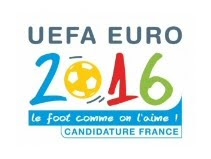 France, who staged the tournament in 1960 and 1984 and have also hosted two FIFA World Cups, won the vote 7-6 at the expense of Turkey, who had been making their third bid for their first major football tournament.
France, who staged the tournament in 1960 and 1984 and have also hosted two FIFA World Cups, won the vote 7-6 at the expense of Turkey, who had been making their third bid for their first major football tournament."This is a beautiful day for us," said Jean-Pierre Escalettes, President of the French Football Federation (FFF).
"It is a moment of intense emotion to know that in 2016 France will welcome European football and will fulfil its promises.
"What counts for us is to have the full confidence of UEFA and this trust will not be betrayed.
"We also understand the frustration of Italy and Turkey - particularly Turkey, who lost by a single vote after bidding for a third time."
France President Nicolas Sarkozy appeared at the ceremony to support his country's bid, sitting alongside the French President of UEFA, Michel Platini, who led his country to victory as an inspirational player in 1984.
Platini sat out the Executive Committee meeting in Geneva which voted on the winners and admitted the contest had put him in a difficult situation - he is French, but of Italian descent and enjoyed his best playing years at Juventus.
"It was not an easy situation for me - I am French, my name is Italian and I have many friends in Turkey. But UEFA have proved once again that we have democracy."
Problems and delays in Poland and Ukraine, who will jointly host UEFA Euro 2012, may have persuaded UEFA's Executive Committee to avoid choosing Turkey, especially as 2016 will be the first tournament to feature 24 teams, expanded from the current 16.
The Turkish government had promised to invest one billion euros of public money in stadiums for the event. It would also have needed to spend some 20 billion euros on national transport infrastructure, including high-speed trains.
"We are devastated. This was our third bid so it is not much consolation to know that we lost by a small margin," said Turkey's Euro 2016 bid manager Orhan Gorbon.
"Losing is one thing but it is an underestimation of Turkey to say it was not capable of hosting a larger tournament, or it was to do with Ukraine... I don't understand why France should be seen as the safe option."
The French budget for stadiums is 1.7 billion euros, of which 39 percent will come from public investment. UEFA's review of the bids said around half of the required private funding had already been secured.
Sarkozy had told UEFA that France wanted to host the event because of, rather than in spite of, the worldwide economic problems.
"We asked ourselves whether we wanted to be candidates in the middle of a crisis," he said during the French presentation.
"But sport is an answer to the crisis. It is because we are in a crisis that we need sport. Nothing is more powerful than sport and, within sport, nothing is more powerful than football."
France's winning bid included 12 stadiums, of which seven would require major renovations and four would be new, in 11 cities: Bordeaux, Lens, Lille, Lyon, Marseille, Nancy, Nice, Paris (Stade de France and Parc des Princes), Saint-Etienne, Strasbourg and Toulouse.
Italy's chances had been written off after a critical review of their bid following UEFA's inspection visits and it was no surprise to see them eliminated in the first round of voting.
"We embarked on this bid as a sporting challenge and in sport you need to know how to accept defeat even if obviously we are bitter," Italian Football Federation (FIGC) President Giancarlo Abete said.
"However, we have no regrets. Everyone played their part. We showed passion, competitiveness, a European spirit but obviously other elements have prevailed."
The three candidates used different tactics in their bid to woo the 13 members of the UEFA Executive Committee, who were eligible to vote.
The Turks followed a similar line to Rio de Janeiro's successful campaign to host the 2016 Olympic Games in trying to urge voters to take the tournament to new pastures.
Italy's case was put by around a dozen teenagers who took it in turns to address the delegates with a cameo appearance by former captain Paolo Maldini.
The French presentation consisted of a young boy asking French officials questions to explain the benefits of hosting the competition, and included a brief appearance by Zinedine Zidane.
Source: Reuters / UEFA

No comments:
Post a Comment